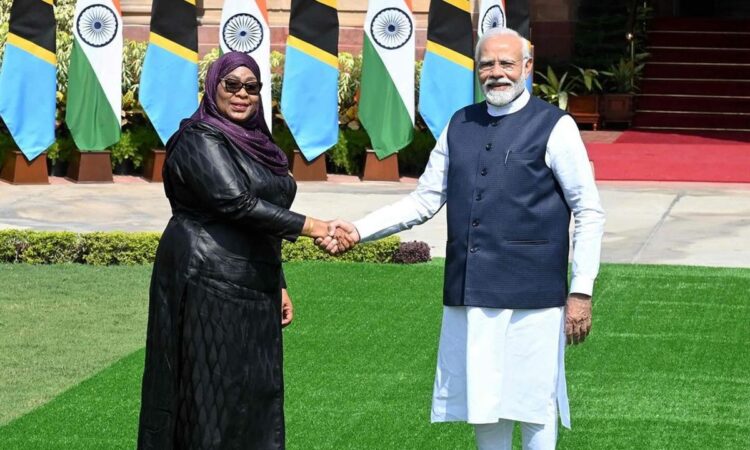
Dar es Salaam. At a time when various economies were grappling with the shortage of the United States Dollar, President Samia Suluhu Hassan and Indian Prime Minister, Narendra Modi, have come up with what could potentially be a game changer.
The two leaders have agreed to accelerate the use of their respective currencies (Tanzanian Shilling and the rupee) to boost trade between their two countries.
The assertion comes barely seven months after Tanzania and India agreed on an arrangement that will no longer make the US dollar indispensable in trade between the countries.
The bilateral trade settlement arrangement inked in March this year allows Tanzania and India to use their own currencies in settlements of trade transactions between the two countries.
And speaking at a joint press conference at the Prime Minister’s Office in New Delhi on Monday, October 9, 2023, Modi said in his private conversation with President Hassan, they discussed ways of boosting trade between their two countries.
This, said Mr Modi, was one of the issues outlined in the decision to raise the two countries’ historic bilateral relations to a strategic level.
“I discussed with President Hassan the need for us to speed up the use of our respective currencies when we trade. Our bilateral relationship has never been better than now, and this move will take our relationship to new heights,” he said.
Data produced during the event by President Hassan put the value of trade between Tanzania and India at around $3.1 billion as of the financial year 2021/22.
But statistics from the Indian government show that until the financial year 2022/23, the value has risen steadily to $6.7 billion.
Bolstering the level of trading in the Tanzanian shilling and the rupee will be a game changer in the sense that it comes at a time when the East African nation, just like many other countries in the world, is grappling with a severe shortage of the United States Dollar.
The shortage is blamed on several external factors, including the war in Ukraine and the economic sanctions imposed on Russia by the US and its western allies, which have disrupted the global supply chain, resulting in an escalation of commodity prices, including petroleum products, wheat, and fertiliser, among others.
It shall also be recalled that the war started at a time when demand for such commodities was already high as global economies were still recovering from the lockdowns initiated during the period of battling the spread of the coronavirus that causes the Covid-19 disease.
In battling inflation, the US central bank has been implementing monetary policy squeezes by raising interest rates, which stifle risk appetites and push up the value of the dollar.
Being the vehicle currency, the impact of such policies is thus felt by all other economies in the world.
In their August 2023 summit in South Africa, leaders of the BRICS agreed to work together on the issue of utilising currencies that are not subject to geopolitical manipulation and sanctions.
Meanwhile, President Hassan and India’s Modi also witnessed the exchange of Memorandum of Understanding (MoU) on six different projects; the building of an industrial park in Tanzania for Indian investors, improvement of maritime industry, sharing of ship information, information and technology and cultural exchange.
President Hassan used the opportunity to thank India for establishing the Indian Institute of Technology (IIT) Madras University in Zanzibar, Tanzania – the first Indian university to be built outside India.
The President, who is on a four-day visit to India, will be awarded an honorary degree by the prestigious Jawaharlal University for her contribution to leadership before attending a Tanzania – Indian Business Forum later.





